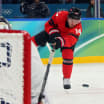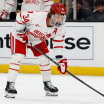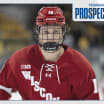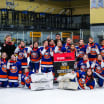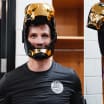Show business historians will tell you that there was nobody who could follow Frank Sinatra's act. He was just too talented a personality; too big. Period!
Likewise, hockey archivists can search until the cows come home but no bench boss in NHL history could follow Al (Radar) Arbour as a winning coach and winning human being. As the song goes, he was, "Too Good To Be True."
Maven's Memories: Replacing the Irreplaceable Radar
Stan Fischler deep dives the 1986-87 season, the Isles first without Head Coach Al Arbour
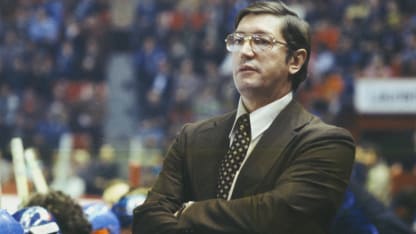
© Denis Brodeur/Getty Images
By
Stan Fischler
Special to NHL.com
Following the 1985-86 season the Hall of Fame dynasty, leader said enough was enough as far as coaching was concerned. Radar retired after 13 seasons behind the Islanders bench and took a front office job.
"There was no doubt about it," said Mike Bossy. "An era had ended."
Now it was Bowtie Bill Torrey's challenge to launch a new beginning, starting with a fresh voice behind the bench. Torrey's question was simple enough to ask but hard enough to answer: How do you replace the irreplaceable?
"Not easy," said Torrey in a masterful bit of understatement.
"Radar was in a class by himself," said Glenn (Chico) Resch who played for years under The Master. "If you wanted to take the qualities of all the best coaches ever and put them together, you'd get Al."
For a replacement it would have been easy for Torrey to peruse the list of job-hunting ex- NHL coaches and find someone worthwhile. But Bowtie had something else in mind; someone new and not-so-well-known.
Scanning the hockey horizon, Bill soon focused on Prince Albert, a small Saskatchewan town with a big-time Junior hockey club.
The Prince Albert Raiders had become dominant in the Western Hockey League and their coach, Terry Simpson, had such a fine record, he was being compared to big-time mentors in football and baseball as well as hockey.
Simpson made sense since the Isles were putting the accent on youth. What could be better than signing the man who was regarded as one of the best coaches of teenagers in Canada?
Apart from Simpson's winning record he had a knack of staying calm under pressure. A homespun Western Canadian, Terry was not given to hyperbole; just the facts, man, only the facts.
"I'm like anybody else," he told the media at his first Islanders press scrum. "I'm a good coach if I've got good players. I'm a bad coach if I have bad players. The players are the ones who actually make or break you."
Meanwhile, Torrey was breaking up that old gang of his. Put on waivers, Clark Gillies wound up a Buffalo Sabre while Clark's buddy, Bob Bourne -- also waived -- donned a Los Angeles Kings jersey.
"I hated to see these guys go because of what they meant to the team and to me and to Al," Torrey explained, "but my job is to rebuild us into a winner."
Bowtie Bill did retain one hero of days past; naming Bob Nystrom as Simpson's assistant coach. All signs indicated that Torrey had done well hiring Simpson and his players seconded the motion.
"I was excited about Terry Simpson leading the team," said Bossy in his autobiography, Boss. "Granted we weren't the elite anymore; we were starting over."
Well, not quite. Bossy's sidekick Bryan Trottier still was around along with captain Denis Potvin not to mention "The Gold Dust Twins" of the 1984 Winter Olympics, Pat LaFontaine and Patrick Flatley.
"Now it's up to the scouting staff to get us more good young players," said Simpson.
Ah, there was the rub. The Nassaumen no longer were blessed with superior picks such as Potvin, Gillies and Bossy. The 1985 first-rounders, Brad Dalgarno (sixth) and Derek King (13th) proved to be late-blooming assets, but took time to develop.
Meanwhile, under rookie coach Simpson the 1986-87 Islanders developed into a playoff-bound team but hardly the NHL's Dreadnaught on ice.
Trottier did his bit, leading the team in scoring with 23 goals and 87 points. Despite significant back issues, Bossy finished with 38 goals -- Mike's first season with under 50 red lights -- and Denis Potvin became the first defenseman in NHL history to score 1,000 points.
An Honor Roll ceremony was held at The Old Barn on March 3, 1987. In a sense it was a tribute to those who contributed to the untouchable record of winning 19 straight playoff series.
They called them "NHL Milestone Awards" and the recipients were duly accorded standing ovations. These included the following:
Arbour for 500 wins; Trottier, 400 goals, 600 assists, 1,000 points; Bill Smith, 500 games and Potvin, 600 assists.
No longer able to steamroll through the league, Simpson's skaters still managed to make the post-season with a 35-33-12 record.
In a sense it was a good thing -- for Simpson's sake -- that the club reached the playoffs. Throughout the season there had been problems both on and off the ice -- as well as in the clubhouse.
Bossy pulled no punches in his autobiography -- BOSS: The Mike Bossy Story, written with Barry Meisel. In it, Mike detailed his growing dissatisfaction with Simpson; starting in November 1986.
The strain between superstar and rookie coach began over a decision by Simpson to replace Bossy with Duane Sutter on a late-game face-off with the team leading Philadelphia, 2-1.
Mike waited until the next day to express his displeasure over the move. Simpson countered, "Don't read into it; I just want to see every player in every kind of situation."
Bossy didn't buy it and told Simpson, "I've proven myself in those situations." The super right wing exited the meeting determined to "forget about the whole thing." But in his book, Mike allowed that such a mental move was tough.
Bossy: "I tried to accept Terry from the first day of camp, I really did, but I missed Al. Al was the only NHL coach I had ever played for and he was a large reason why I developed into a complete player."
Then, a pause and an afterthought: "When I walked out of Terry's office after that conversation, I knew that things would never be the same."
Making matters worse, Bossy's ailing back became such a serious issue that he stopped playing after a March 21st game with the Rangers in Uniondale.
Mike would return for the first playoff round against Washington; a most memorable series.
You'd better believe it was memorable, because in that tourney the Islanders played what many insist was the best game in franchise history.
In a recent issue, The Hockey News placed "The Easter Epic" as Game Number Two in its issue of "Greatest Games of All-Time."
LISTS: FOUR REASONS WHY THE 1986-87 SEASON WAS TEMPESTUOUS:
1. NEW MENTOR: Al Arbour retired to take a front office job with the team and was replaced by Terry Simpson who had no NHL experience.
2. GOOD-BYE TO GOOD FELLOWS: Stanley Cup heroes of yesteryear, both Bob Bourne and Clark Gillies were put on waivers and claimed by Los Angeles and Buffalo, respectively.
3. BOSSY VS. SIMPSON: Although the dispute between the ace right wing and the new coach was hidden from the media both Mike and Terry were aware of, and not overjoyed with their disagreement.
4. HOMESTRETCH WOES:The second-place Islanders led Washington by three points with seven games left in the season. But the Caps caught and passed the Isles, winning first round home ice advantage in the process.

